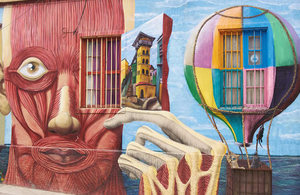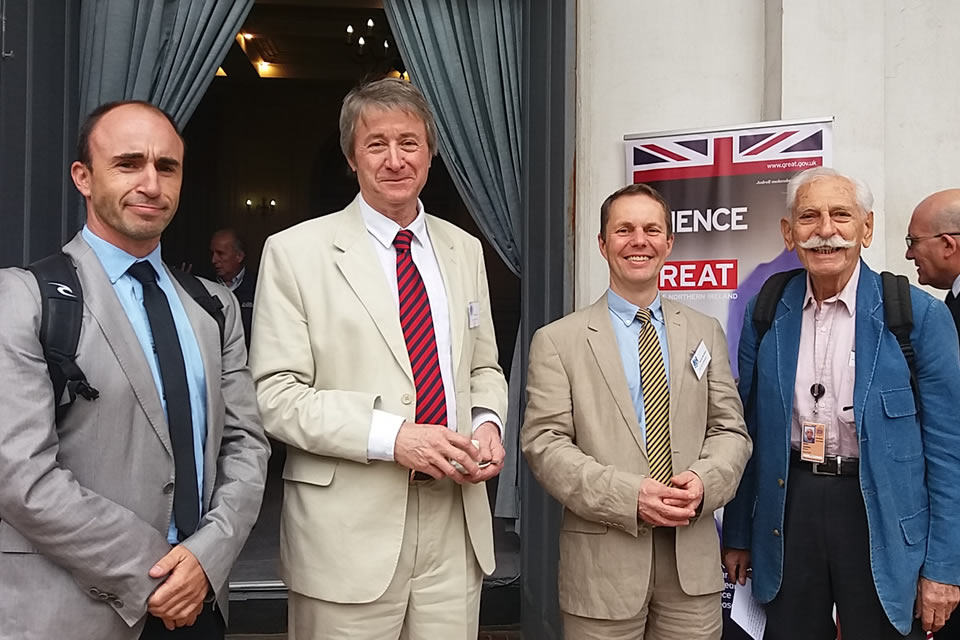British experts participate at heritage seminar in Valparaíso
Embassy facilitated a seminar on the heritage of Valparaiso and its potential to act as a catalyst for the wider regeneration of the city.

Image of Valparaíso taken by Jeremy Richards.
Valparaiso is one of the world’s great 19th century trading cities and the cultural capital of Chile. People care passionately about its future. In recent years, much has been achieved, but it remains faced with numerous challenges – acute social problems, financial austerity and balancing new development against the need to manage its spectacular heritage.
In recognition of the special relationship that exists between the UK and Chile, and the shared heritage of our two countries, the British embassy worked in partnership with the Fundacion Piensa and Corporacion Metropolitika, to facilitate a public seminar on the heritage of Valparaiso and its potential to act as a catalyst for the wider regeneration of the city.
The event, which took place on 24 March at the Museo Marítimo, was supported by the Valparaiso Municipality and opened by Ambassador Fiona Clouder and the new Mayor Jorge Sharp. Attended by over 200 people, it attracted widespread interest and generated a lively discussion. In the afternoon, the key stakeholders came together to discuss the challenges and opportunities facing the city, in particular, proposals for the expansion of the port, the development of a shopping mall and their implications for the future of the World Heritage Site.
British heritage experts

British experts Philip Davies (centre left) and Duncan McCallum (centre right) and seminar participants of heritage seminar in Valparaíso.
Many declining waterfront and port cities around the world face similar challenges. Given the extensive experience of heritage-led urban regeneration projects in the UK, the embassy arranged for two UK experts, Philip Davies and Duncan McCallum, to attend the event to explain how successful schemes have been achieved in similar circumstances - both in the UK and globally – and the lessons learned.
By exchanging experiences and insights with their Chilean counterparts, the UK team identified some common themes and potential solutions. These are one of the principal outputs of the event and will be the subject of a short summary paper for further discussion between the interested parties.
After explaining the importance of understanding the qualities that make Valparaiso unique, Philip Davies highlighted how built heritage is a vital economic, social, cultural and environmental asset. As regional cities compete for inward investment and development, he explained how experience shows that people and businesses will choose places with something special to offer.
He emphasised that heritage-led regeneration pays real economic dividends. After looking at various UK examples including London Docklands, Covent Garden, Kings Cross, Woolwich Arsenal and Dundee, he highlighted how similar initiatives in Cape Town and Buenos Aires have turned once derelict port areas into thriving new city neighbourhoods creating jobs, skills, inward investment and opportunities for all. Similar initiatives are underway in Yangon and Kolkata.
Valparaiso has been described as the Liverpool of the Pacific, so it was very instructive for Duncan McCallum to draw parallels between the two cities and to explain how Liverpool has been transformed in the past 20 years by attracting new development alongside the regeneration of its historic waterfront and docks – the largest adaptive re-use project in Europe. The old dock buildings have been converted to form hotels, a conference centre, restaurants, shops and housing plus a major new cultural attraction with a branch of the famous Tate Gallery. Balancing new development and heritage is never easy. He highlighted some of the current challenges in Liverpool and other historic cities– not least the potential impact of tall buildings, and the importance of controlling their location and relationship to the wider historic context; issues which are just as relevant in Valparaiso.
Local experience
Marcelo Ruiz, the distinguished architect and professor from the Universidad Católica de Valparaiso, completed the morning session with some valuable insights into Valparaiso and its urban dynamics in relation to other cities in Chile and elsewhere, after which the panel of experts responded to questions from the audience.
Since the event the Embassy has received very positive feedback from many quarters. While the UK has been pleased to help in some small way by sharing experience and celebrating what in many areas is a shared heritage, it is for the people of Valparaiso and Chile to decide what sort of city they want Valparaiso to be.
Further information
For more information about this event, contact Marianne Becker, Head of Communications, British Embassy, Santiago.
For more information about the events and activities of the British Embassy in Santiago, follow us on: